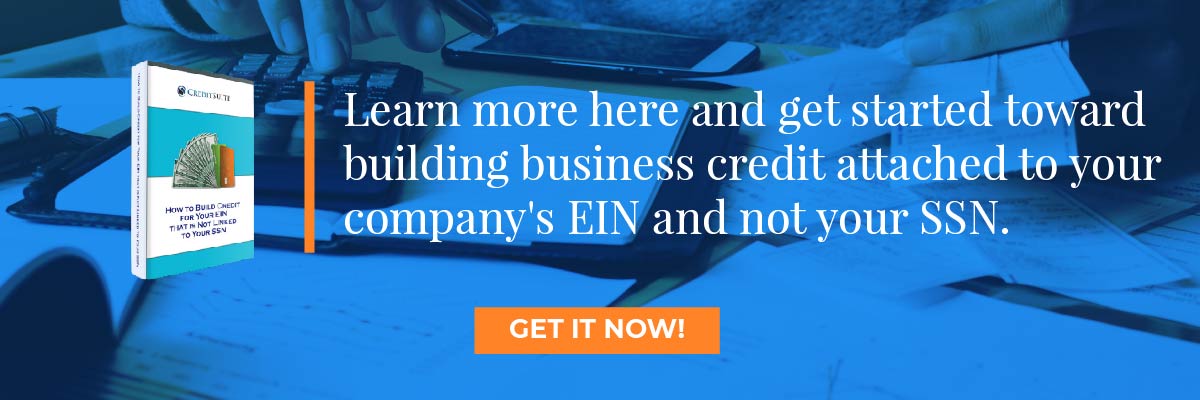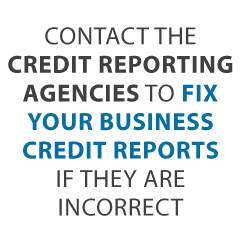- Connect With Us!
- (877) 600-2487
- info@creditsuite.com
You Got This: How to Easily Pull and Review Your Business Credit Reports
Published By Janet Gershen-Siegel at September 2nd, 2017
You Should Review Your Business Credit Reports – We Show You How
Your best choice as a small business owner is to stay on top of your small business credit reports from PAYDEX, Equifax, and Experian. As an entrepreneur, part of your mission is to review your business credit reports.
There are three big credit reporting bureaus for small business and you absolutely should assess all three of them regularly. This is because they use marginally different measurements. Hence moving the needle for one can move the needle for the two others. Bet perhaps not as much.
Do not permit your small business credit scores slide, as you need to catch any mistakes as soon as you can. Plus, you need to detect anything which is dragging your scores downward. And then take remedial action. You can get your reports conveniently and stay right on top of all three scores by following a few simple steps.
Review Your Business Credit Reports at D&B (PAYDEX)
Dun & Bradstreet’s PAYDEX score of your company can wind up being one of the prime reasons why your small business obtains credit at all.
D & B furnishes Credit Signal, which is a method to keep an eye on your credit score by having the reports come straight to you, for a price. You may find the cost is well worth it in order to avoid the problems that can stem from letting this score slip. And you will not have to produce and handle the scheduling and reminders you might need to stay up to date with if you don’t use it.
Alternatives to Credit Signal
Don’t want to use Credit Signal? No problem, as you can get your PAYDEX report here and, if necessary, you can contact their Customer Service department (this department exists as a part of Dun & Bradstreet itself) here.
In addition, D & B’s PAYDEX Customer Service phone number is here. In order to review your PAYDEX report, check out what D & B provides, which is a sample report and even some higher level guidance in how to interpret it.
Review Your Business Credit Reports and Understand Dun & Bradstreet’s PAYDEX Business Credit Scores
A PAYDEX Score from Dun & Bradstreet runs from 0 to 100. This score has a basis in payment data which is on report to the bureau. Or it is on report to data-gathering companies partnering with the CRA. https://creditreports.dnb.com/m/business-glossary/paydex-score.html
D & B uses this data, along with a credit score and Financial Stress Score, so as to advise just how much credit a loan provider should extend to your company.
Getting a PAYDEX Score
To obtain a PAYDEX score, you have to file for a D-U-N-S number by using Dun & Bradstreet’s web site. The number is cost free. Plus the CRA will require to have records of your payments with four or more sellers.
Your company’s PAYDEX score reveals if your payments are normally made punctually or in advance of schedule. As you might expect, a higher number is better.
PAYDEX Score Details
The scores break down as follows:
80 – 100: A low risk of late payments
50 – 79: A medium risk of late payments
0 – 49: A high risk of late payments
D&B Business Credit Scores
Your company’s credit rating runs from 1 to 5. 1 is the very best score. This matches your firm with various other companies with similar payment histories. The score shows just how often those business often tend to pay without delay.
This data can really help loan providers to acknowledge your company’s standing. Yet it does not truly reflect every one of the payment records from your company.
Financial Stress Score
The Financial Stress Score likewise runs from 1 to 5. It matches your company with various other companies sharing comparable financial and company qualities.
These resemblances are in areas such as size or amount of time in business. This score demonstrates exactly how regularly those companies have a tendency to pay on time. As before, 1 is the best score. This rating is a more comprehensive investigation of the business landscape, versus an analysis of your company’s real payment history.
An outstanding PAYDEX score for your company is 80 – 100.
Learn more here and get started toward building business credit attached to your company’s EIN and not your SSN.
Review Your Business Credit Reports at Equifax
Equifax one of the large credit reporting agencies, offers a risk monitoring service which is more convenient as it allows for reports to come straight to you.
If you don’t want to pay for ongoing reports, you can instead order your business’s Equifax report here.
In addition, if you need to dispute your small business’s Equifax report, you can do so by following the instructions here.
You can learn to review your Equifax report by checking out a sample of their reports.
Review Your Business Credit Reports and Understand Your Equifax Business Credit Scores
The Equifax Credit Risk Score comes from a model which they use to rank specific risks. Equifax uses these information in its estimations, including the depth of the credit info Experian can obtain, the length of your company’s credit history, and your business’s payment delinquency history. http://www.equifax.com/business/equifax-risk-score
http://www.equifax.com/assets/USCIS/efx-00178_efx_risk_score.pdf
http://www.equifax.com/assets/USCIS/efx-00164-9-13_efx_bni.pdf
Equifax then segments some 5 separate scorecards with each other, by using statistical analysis. In order to boost their accuracy, Equifax recommends integrating their Credit Risk Score with their exclusive Equifax Bankruptcy Navigator Index.
The Bankruptcy Navigator Index helps forecast the possibility of your company declaring bankruptcy in the next 24 months. Equifax bases its predictive model on over 270 million separate accounts.
Equifax shows three different company determinations on its industrial credit reports. These are the Equifax Payment Index, your company’s Credit Risk Score, and its Business Failure Score.
Equifax Payment Index
Comparable to the PAYDEX rating, Equifax’s Payment Index, which has its dimension on a scale of 100, shows how many of your firm’s payments were made promptly. These include both data from credit issuers as well as vendors.
However it’s not indicated to anticipate future actions. That is what the other two ratings are for.
Equifax Credit Risk Score
Equifax’s Credit Risk Score assesses just how most likely it is your business will become severely overdue on payments. Scores range from 101 to 992, and they examine:
- Available credit limit on revolving credit accounts, e. g. credit cards
- Your company’s size
- Evidence of any type of non-financial transactions (e. g. vendor billings) which are overdue or were on charge off for two or more invoicing cycles
- Length of time since the opening of the oldest financial account
Equifax Business Failure Score
Finally, Equifax’s Business Failure Score hlooks at the risk of your business closing. It ranges from 1,000 to 1,600, examining these elements:
- Total balance to total current credit limit average utilization in the previous three months
- The length of time since the opening of the oldest financial account
- Your company’s worst payment status on all trades in the previous 24 months
- Documentation of any kind of non-financial transactions (e. g. vendor billings) which are past due or have been on cost off for two or more billing cycles.
Equifax Scoring Analysis
For the credit risk| and business failure scores, a rating of 0 means bankruptcy.
An outstanding Equifax score for your company is as follows:
- Payment Index 0 – 10
- Credit Score 892 – 992
- Business Failure Score 1400 – 1600
Review Your Business Credit Reports at Experian
Experian, one more big credit reporting bureau, also offers a way for getting reports sent to you for a charge. As a result you can follow your Experian small business credit score here and the setup is effortless.
However, if you prefer to not get regular reports (and purchase them), then you can order a single Experian report for your small business on their web site, here.
Likewise, if there are any troubles or mistakes, you can contest any errors on your business’s Experian report if you follow the directions on their site, here.
Find out about reading through your Experian report by evaluating a sample Experian business credit report.
Review Your Business Credit Reports and Understand Your Experian Credit Scores
Experian’s scoring system is called Intelliscore Plus. http://www.experian.com/business-information/credit-risk-management.html
What is the Intelliscore Plus Credit Score?
The Intelliscore Plus credit score is a statistically based credit-risk assessment. The key function of Intelliscore Plus is to assist businesses, investors, and possible future loan providers make wise judgments concerning who they should or should not do business with.
Like a car dealer uses a customer’s FICO score to quickly identify just how much of a credit risk a potential customer might be, the Intelliscore Plus credit score can provide understanding on how much of a credit risk a business or company owner may be.
Intelliscore Plus Credit Score Range
The Intelliscore ratings vary from 1 to 100. So the higher your score, the lower your risk class. The chart below details each Intelliscore Plus credit score range and its associated meaning.
Score Range/Risk Class
76 – 100 Low
51 – 752 Low – Medium
26 – 503 Medium
11 – 254 High – Medium
1 – 105 High
Computing an Intelliscore Plus Credit Score
In the credit world, Intelliscore Plus is considered one of the most reliable tools in effectively forecasting risk. One of the ways Intelliscore Plus maintains this claim to fame is by recognizing the significant variables that reveal if a business is likely to pay their debts.
Though there are over 800 commercial and owner variables constituting an Intelliscore Plus credit score, the variables can be broken down into these essential elements:
Payment History
The bureaus call this recency but in the real world, it’s nothing more than your current payment status. This includes the amount of times your accounts end up being overdue, the number of accounts that are presently delinquent, as well as your overall trade balance.
Frequency
Much like payment history, frequency make up the quantity of times your accounts have been sent out to collections, the amount of liens and judgments you might have, as well as any bankruptcies connecting with your business or personal accounts.
Frequency can additionally include information associating with your payment patterns. Were you routinely slow or late with payment? Did you start off paying costs late, however over time, quit doing so? These elements will all be considered.
Monetary
This specific element concentrates on exactly how you make use of credit. As an example, just how much of your available credit is currently being used? Do you have a high proportion of overdue equilibrium in contrast with your credit limits?
If you’re about to begin a company or are rather new to this game, the listing above may seem a bit overwhelming. If you have not begun or don’t have a long history of firm-based purchases, just how will Intelliscore Plus rate you?
Intelliscore Plus manages these circumstances by using a “blended model” to develop your score. This suggests that they take your individual credit score into factor to consider when determining your business’s credit score.
Learn more here and get started toward building business credit attached to your company’s EIN and not your SSN.
Review Your Business Credit Reports and Start Monitoring Your Business Credit For Less
Know what is happening with your credit. Make sure it is being reported and deal with any inaccuracies ASAP. Get in the habit of taking a look at credit reports and digging into the specifics, and not just the scores.
We can help you monitor business credit at Experian and D&B for 90% less than it would cost you at the CRAs. See: fastcs.wpengine.com/monitoring.
At Equifax, you can monitor your account at: www.equifax.com/business/business-credit-monitor-small-business. Equifax costs about $19.99.
Review Your Business Credit Reports and Update Your Data
Update the information if there are mistakes or the information is incomplete. At D&B, you can do this at: https://iupdate.dnb.com/iUpdate/viewiUpdateHome.htm. For Experian, go here: www.experian.com/small-business/business-credit-information.jsp. So for Equifax, go here: www.equifax.com/business/small-business.
Learn more here and get started toward building business credit attached to your company’s EIN and not your SSN.
Review Your Business Credit Reports and Fix Your Business Credit
So, what’s all this monitoring for? It’s to dispute any inaccuracies in your records. Errors in your credit report(s) can be fixed. But the CRAs often want you to dispute in a particular way.
Get your business’s PAYDEX report at: www.dnb.com/about-us/our-data.html. Get your company’s Experian report at: www.businesscreditfacts.com/pdp.aspx?pg=SearchForm. And get your Equifax business credit report at: www.equifax.com/business/credit-information.
Review Your Business Credit Reports and Start Disputes if You Need to
Disputing credit report inaccuracies usually means you mail a paper letter with copies of any evidence of payment with it. These are documents like receipts and cancelled checks. Never mail the originals. Always mail copies and retain the originals.
Fixing credit report inaccuracies also means you precisely detail any charges you contest. Make your dispute letter as crystal clear as possible. Be specific about the concerns with your report. Use certified mail so that you will have proof that you sent in your dispute.
Dispute your or your company’s Equifax report by following the directions here: www.equifax.com/small-business-faqs/#Dispute-FAQs.
You can dispute errors on your or your company’s Experian report by following the instructions here: www.experian.com/small-business/business-credit-information.jsp.
And D&B’s PAYDEX Customer Service phone number is here: www.dandb.com/glossary/paydex.
Review Your Business Credit Reports: Takeaways
In many instances, it pays to hand over a few dollars to make certain you receive your small business credit reports regularly. It’s a lot easier than to have to remember to do this.
And you’ll probably review your business credit reports more thoroughly, as they come at a price.
Stay on track and use the tools that these credit reporting companies supply, and make your life simpler. It goes without saying; you’ve already got enough on your plate.
Because of the recent data breaches, there are all the more reasons to review your small business and personal credit reports, and be vigilant about any mistakes you discover.

 " class="attachment-blog-single size-blog-single wp-post-image" alt="Get Business Credit Cards for New Businesses Credit Suite-Business Line of Credit Decoded" title="Get Business Credit Cards for New Businesses">>
" class="attachment-blog-single size-blog-single wp-post-image" alt="Get Business Credit Cards for New Businesses Credit Suite-Business Line of Credit Decoded" title="Get Business Credit Cards for New Businesses">>
